Stay in the know on all smart updates of your favorite topics.
Digital tools as enablers of a circular economy. The Amsterdam case

In the 19th episode of the Better cities - the contribution of digital technology-series, I address the question of how digital technology can help in the long road to a circular society.
The contribution of digital technology becomes most visible when viewed in conjunction with other policy instruments and actions. That is why in this episode Amsterdam is in the spotlight; this city has been pursuing a consistent circular policy from 2015 onwards.
Why is a circular economy necessary?
European countries together need an average of 2.9 copies of planet Earth to meet the needs for raw materials. But even one Earth has finite resources, and it is therefore obvious that more and more countries aim to be circular by 2050. The circular processing ladder contains a range of options with the lowest step recovery of energy from materials unsuitable for re-use and furthermore recycling, repurposing, remanufacturing, renovation, repair, reuse, reduction, reconsideration to rejection.
A circular economy is an economic and industrial system that eliminates waste and takes the reusability of products and raw materials and the regenerative capacity of natural resources as a starting point, minimizes value destruction in the total system and pursues value creation in every link of the system. In this context, the term cradle-to-cradle design is often referred to. This is done in terms of material flows and the preservation of values, so that in the long term there is no longer any need for an influx of virgin materials. Maersk has developed a cradle-to-cradle passport, a first for the shipping industry, consisting of a database of all ship components, including all the steel, for recycling, reuse and remanufacturing of new ships or their parts.
The Digital Sustainability-memorandum is considering digitization as an enabler on the way to a circular economy. A fourfold distinction is made in this regard: (1) the coordination of supply and demand of materials, (2) facilitating maintenance and repairs, (3) improving the production process, and (4) supporting partners in chain cooperation. Examples of all these options are discussed below.
Amsterdam and the realization of circular principles
Amsterdam's ambition is to use 50% less virgin raw materials by 2030 compared to the current situation. This goal is also very important for achieving its climate targets: 63% of the CO2 emissions for which the city is responsible come from products and materials that are produced abroad. The municipal government can only partly influence this steam. That is why the policy focuses on three areas where the city has most influence, namely food and organic residual flows, consumption and the built environment.
Amsterdam published its first policy plan Amsterdam Circular: Vision and roadmap for the city and regionin 2015. The emphasis was on organic waste and the built environment. It included 75 action points and its approach was positively evaluated in 2018 and a new report was published. It was decided to continue with the same emphasis with the addition of food and consumption. The addition of consumption was obvious, because Amsterdam had been making a strong case for the sharing economy for some time.
Shortly after the publication of the new report, Kate Raworth’s donut-principles made their entrance. Remarkably, none of the previous reports contain a reference to her work on the donut economics. In May 2019, the first fruit of the collaboration with Kate Raworth appeared, building on the report from the previous year. The collaboration resulted in a new report Building blocks for the new Amsterdam Circular 2020-2025 strategy, involving many stakeholders from the sectors, food and organic residual flows, consumption, and construction. It resulted in 17 building blocks, named 'development directions'.
This report was based on the original 2012 publication on the donut economy. However, there turned out to be one pitfall. The original donut model was designed for global-level applications, which, according to Kate Raworth, cannot be directly traced to the urban level. The social implications of behavior in one city not only affect this city itself, but also the rest of the world. The same applies to the ecological aspects.
As a next step Kate Raworth invited representatives from Amsterdam, Philadelphia and Portland to join a task force and discover what a city-level donut model looks like. In each of these cities, dozens of officials and citizens participated in an interactive process. The result was a new model that uses four lenses to view urban activities: The first and second resemble the original lenses but applied at the city level, for example, the impact of local industry on local nature. The third is how activities in a certain city had a negative social impact on the rest of the world, think for example of clothing, produced under poor conditions. The fourth is the impact of local actions on nature worldwide.
These activities resulted in a new publication, The city donut for Amsterdam. It is an instrument for change that can be applied more broadly than to circular policy. In this publication, the new donut model is mainly used as a conceptual model. Instead of exact calculations, snapshots are collected as illustrations.
While city representatives were busy developing the urban donut model, the work towards the circular city continued unabated, resulting in the publication of the final circular strategy for the period 2020 – 2025 and the action plan for the period 2020 – 2021 at almost the same time. In terms of content, these plans are in line with the publication of the building blocks-report from 2019, including the application of the 'old' donut model from 2012.
In the following, I use both the strategy and the action plan to show the role of digital tools. At the end, I come back to the future role of the city donut.
Digital techniques in the circular strategy of Amsterdam 2020 – 2025
I align with the three value chains: food and organic residual flows, consumption and the built environment that are central to the strategy. Three ambitions are formulated for each of these three, further detailed in several action directions, each containing several projects, most with measurable results to attain in 2021. In addition, a couple of projects are described, that bare related to types of companies, institutions and the port. Finally, there are overarching projects, in which I will again pay attention to digitization, also because the role of the city donut will become visible here.
Below I briefly describe the three value chains, name the three ambitions for each, and give references to digital tools that will play a role within each of the three value chains.
Value chain food and organic residual flows
The municipality wants to combat food waste and reuse organic residual flows as much as possible. The role of regionally produced (plant-based) food will be strengthened in line with the Amsterdam food strategy. In realizing its objectives, the municipality participates in an extensive European project, Rumore.
The three ambitions are: (V1) Short food chains provide a robust, sustainable sensory system, (V2) Healthy and sustainable food for Amsterdammers and (V3) Food and organic residual flows.
Examples of digital tools
• GROWx vertical farm is a farm that aims to achieve maximum returns by applying artificial intelligence to the indoor cultivation of food crops, among other things.
• Restore is a measurement system and simulation model for Amsterdam and surrounding municipalities and companies that provides insight into the financial, ecological, and social effects of various forms of composting and bio-fermentation, including the use of biomass.
• The InstockMarket platform will map (surplus) food flows and - if possible - predict them so that the catering industry can anticipate this when purchasing. The data from this project will be linked to the circular economy data platform
• The Platform www.Vanamsterdamsevloer.nl makes all local food initiatives (including food events) visible and residents of Amsterdam can share news about food and urban agriculture.
Value chain consumer goods
The emphasis is on consumer goods that contribute substantially to the depletion of rare raw materials, their production is polluting and often takes place under poor working conditions. In addition, the impact on climate change is significant. The emphasis is on electronics, textiles, and furniture because repair is also possible in each of these cases.
Furthermore, a lot of profit can be made by good collection and reuse through sharing and exchange.
Here too, a multi-year research project funded by the European Commission is important. The Reflow project maps data on flows of materials and develops processes and technology to support their implementation.
The ambitions are :(C1) The municipality is setting a good example and will consume less; (C2) Together we make the most of what we have and (C3) Amsterdam makes the most of discarded products.
Examples of digital tools
• The municipality will develop digital tools within the (purchasing) systems that support civil officers in circular procurement.
• The West-district supports www.warewesten.nl. This website brings together the sustainable fashion addresses of Amsterdam-West.
• Using artificial intelligence, among other things, it is being investigated how the lifespan of various goods can be extended so that they do not end up with bulky waste. This can be used, for example, on the municipal website to offer the option of first offering goods for sale or for giving via existing online platforms before they are registered as bulky waste.
• Indirectly, it is worth noting that the municipality wants to make the use of ICT more sustainable by purchasing less equipment (for example through 'hardware as a service'), extending the lifespan of equipment and reducing its energy consumption.
Value chain built environment
This value chain was also chosen because the municipality has an important voice in what and where is built and in the development of the public space. The municipality itself is also a major user of buildings.
In terms of the built environment, circular construction can be achieved through large-scale reuse of construction waste. By ensuring that buildings can be used for more purposes, their demolition can be slowed down. Sustainable materials can also be used in the design of public spaces – from roads and bridges to playgrounds. In addition, consideration could be given to the climate-adaptive design of the city, resulting in cleaner air and dealing with increasing heat and rainfall.
The ambitions are: (G1): We do circular development together; (G2) The municipality sets a good example and uses circular criteria; (G3) We deal circularly with the existing city.
Examples of digital tools
• Introduction of large-scale application of material passports to have the most complete information possible on material use in all phases of the life cycle of buildings. This is linked to national plans, among other things by providing all materials with an OR code.
• Research into the possibilities of a (national) online materials marketplace. Such a marketplace will influence (local) material hubs, such as the Amstel III construction hub and the creation of circular business cases.
• Providing insight into the supply (demolition, renovation) and demand (new construction, renovation) of circular building materials and thus of circular material flows.
• Creating a digital twin of the public space and the subsurface to be able to furnish and maintain it functionally and circularly.
• Research in digital production due to the rapid development of digital production techniques and their applications, such as robots and 3D printing.
• Research into making the construction, equipment and water and energy consumption of data centers more sustainable.
• Research into which data about residents and users of buildings can be made public and which data should remain private.
The municipality could further simplify the process of permit applications by digitizing everything, enabling applicants to upload the necessary municipal data and construction drawings and calculating the BREAAM score. This applies to both new and renovated buildings.
Overarching theme: Data platform and monitor circular economy
On the road to a circular economy, a lot of data will become available and just as much data is needed to help citizens, companies, and institutions to make sustainable choices and to determine whether the goal of 100% circularity by 2050 is within reach. That is why a data platform and monitor is being developed. This numerically maps all material, recycle, residual and waste flows that enter, leave, and go around the city. This also makes it possible to calculate the impact on CO2 emissions. The data from the material passports and the materials marketplace are also integrated herein, if possible. The monitor also includes social aspects such as health, education, and equality. Relevant data will be open and accessible, so that it can be used for the development of new innovations and applications by the municipality and third parties, also to connect with other urban transitions.
The monitor connects to the four lenses of the city donut of Amsterdam and will collect the data that is currently missing to provide full quantitative insight. This also concerns the environmental impact of all materials that Amsterdam imports for its own consumption. Where the city donut is currently only a partially quantified, the monitor will continuously provide insight into whether the municipality is staying within the ecological preconditions or where it falls short with regard to the minimum social requirements.
Amsterdam's circular strategy and the resulting action agenda is ambitious and will inspire many other cities. Because many projects are small- and medium scaled, it is not yet possible to assess to what extent the strategy and action agenda help to achieve the targets (50% circularity in 2030 and 100% in 2050). Commitment to the development of the monitor is therefore crucial and the municipality will also have to keep an open eye on the parallel actions that citizens, the business community, the port and other institutions must take to achieve their share. After all, becoming circular encompasses much more than food and organic waste, consumption, and construction.
To document the process of the City of Amsterdam's adaptation of circular policy and the contribution of Kate Raworth, I have put together a brief dossier. This includes references to (copies of) all relevant reports and an indication of their content. This file can be downloaded by following the link below.:
https://www.dropbox.com/s/lntf8izqz7ghvqp/Dossier%20circularity.docx?dl=0
The interconnected city with nature, communities and resources

In December, the Metabolic Cities team created a series of 3 articles on what future cities can become based on interconnections with nature, communities and resources.
If you haven’t already, take a look and tell us what you think.
An inclusive nature city allows species to thrive: https://www.metabolic.nl/news/interconnected-city-nature/
Interconnected communities, vital for healthy cities: https://www.metabolic.nl/news/interconnected-city-community/
Reconnecting to resources brings operations within planetary boundaries: https://www.metabolic.nl/news/interconnected-city-resources/
Feeding the city

More than 50% of the European population currently lives in urban areas, a proportion that is projected to increase to almost 70% by 2050. Distributed small scale urban food growers can together make a difference in providing healthy food in cities, in a climate neutral and sustainable way. Zéger Nieuweboer, the founder of the urban food growers cooperation www.arnhemgroen.nl gave an interview about the YIMBY experience of small scale food growing.in the city.
Programma van Demodag #15 Energie & Circulair
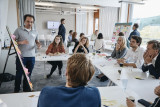
Volgende week donderdag 10 maart vindt de eerste demodag van 2022 plaats. De thema’s Energie en Circulair staan centraal, en het programma is inmiddels rond. Er staan weer mooie initiatieven en complexe vraagstukken op de planning.
Demodagen zijn onderdeel van ons innovatieproces en bedoeld om de voortgang van verschillende innovatieprojecten te stimuleren, hulpvragen op tafel te leggen, dilemma's te delen en anderen te betrekken bij projecten of uitdagingen. Meer informatie over wat de demodagen precies zijn en waarom je mee wilt doen, vind je hier.
Klinkt het programma interessant? Je bent meer dan welkom om aan te sluiten. Laat het ons weten in de comments!
Pitches:
SmartHoods
SmartHoods is een holistische aanpak om zelfvoorzienende buurten te realiseren. Dit concept is ontwikkeld door Spectral, Metabolic en de VU. Florijn van Metabolic is nu bezig dit concept zelfstandig verder te brengen. Zijn missie is om de meest leefbare en duurzame wijken te realiseren en vraagt de hulp van het netwerk om hieraan bij te dragen.
Green Light District / New Bauhaus - Gemeente Amsterdam / Hogeschool van Amsterdam
Het Green Light District project is opgezet om delen van de binnenstad en de Wallen te verduurzamen. De volgende stap voltrekt zit binnen de New Bauhaus oproep van de EU-commissie. Gemeente Amsterdam vertelt waar ze nu mee bezig zijn en nodigt het netwerk uit om mee te denken.
De Circulaire Monitor - Gemeente Amsterdam
De eerste versie van de Circulaire Monitor Amsterdam is een feit! Tijdens de Week van de Circulaire Economie is deze gelanceerd. Voor het eerst hebben we een totaalbeeld van alle materialen die in, door en uit de stad stromen, inclusief lokale productie en consumptie. Daarnaast hebben we berekend wat de milieueffecten van deze materiaalstromen zijn. Een game changer in onze journey naar een circulaire stad! Welke data vind je terug in deze monitor en wat kunnen wij ermee?
Werksessies:
De maatschappelijke kant van Smart Grids - Hogeschool van Amsterdam / Gemeente Amsterdam
Om de toenemende congestie op het energienet op te lossen, komen we met oplossingen als flexibilisering, energieopslag en energyhubs. Een slim energienet wordt nu vooral gedreven door acute problematiek. Maar hoe kunnen we deze innovaties breder maatschappelijk benutten? Wat is de sociaal-economische impact van smart grids en wat is er nodig om die te bevorderen?
Macht in de energietransitie - DRIFT
Minder macht bij grote bedrijven, meer macht voor bewonersorganisaties; hét gevolg van decentralisatie van productie en distributie, zeggenschap, eigenaarschap en winst en (overheids)sturing. Waar gaat de macht heen? Hoe wordt er met deze nieuwe macht omgegaan? En hoe kunnen we de impact ervan in goede banen leiden?
Circulaire Energietransitie
Een belangrijke stap in het verduurzamen van de regio is het circulair maken van alle technische maatregelen die voor de energietransitie worden ingezet. Denk aan windmolens, zonnepanelen, warmtepompen, of isolatiemateriaal. De angst bestaat dat een circulaire energietransitie tot vertraging of extra hoge kosten kan leiden. Toch zien we gelukkig al veel mooie initiatieven in ons netwerk en dit willen wij verder aanjagen. Waar moeten we dan beginnen?
De duurzame toekomst van Amsterdams afvalwater
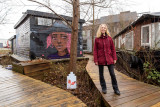
Als je de wc doortrekt, denk je waarschijnlijk niet na over wat er met het water gebeurt. Maar hier gaat een hele wereld achter schuil! En er wordt hard aan gewerkt, om die verborgen waterwereld duurzamer te maken. Als innovatietechnoloog bij Waternet houdt Enna zich bezig met het ontwikkelen van slimme afvalwatersystemen, en wij van De Gezonde Stad interviewden haar.
Wat is jouw droom voor Amsterdam?
“Dat water voor Amsterdammers meer waarde heeft. Dat we het meer respecteren. Nu is het zo vanzelfsprekend dat er water uit de kraan komt, zoveel en wanneer we maar willen. En we gaan naar het toilet, of onder de douche, of zetten de afwasmachine aan, en voor de bewoners is het water weg. Het zou fijn zijn als de hele cyclus meer circulair is. Dat afvalwater niet langer iets is wat vies is, maar dat we het gaan zien als een grondstof die we graag willen hergebruiken. Wat nou als je bij de bouwmarkt een toilet kan kopen die jouw urine apart houdt en daar meststof uithaalt die je zelf in je tuin kan gebruiken of af kan geven alsof het een statiegeldsysteem is. Dan krijgt het zoveel meer waarde.”
Lees op onze website het hele interview en leer de verborgen waterwereld kennen!
HOW CIRCULAR FESTIVALS CONTRIBUTE TO CLIMATE GOALS
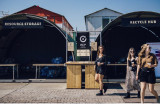
On 10 February during the CE Week there is an opportunity to help the community of the International Green Deal Circular Festivals! Beside the facilitating Dutch Ministries of IenW and EZK now consisting of 20 large international festivals. Lowlands/MOJO, Body & Soul, Awakenings, Roskilde, Milkshake, ID&T, Zwarte Cross, DGTL, Pukkelpop, Vierdaagsfeesten… just a few examples of large European festivals participating.
The focus of the workshop will be on how to become climate neutral as festival, through their efforts to become circular: two sides of the same coin. Why is action needed now, what can festivals do and how to set concrete targets? Together these international front runners join forces to give direction to a sustainable and resilient future for the live sector. Moreover as perfect living labs, festivals can inspire visitors, cities and other events to join this green movement!
If you feel you can add to this discussion and help making the festivals enthusiastic to take action, then please join our meeting. Also if you see other relevant connections and opportunities; please register via the website below!
For the Ministry of Infrastructure and Water management and together with partners, the Strategy and Management Consultants of RHDHV execute the program management of this Green Deal from 2019-2025.
Circular City Challenge Berlin, Munich, Stuttgart, Vienna
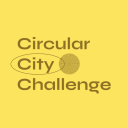
The Circular City Challenge calls on innovators of the Circular Economy to find answers to the challenges of the transformation to a circular urban system.
To do so, @CircularBerlin, @CircularMunich, @materialkreislauf. und #circonnact are going on a joint search for circular and innovative approaches to advance the Circular Economy in cities and to explore and implement promising solutions together.
Do you feel like this post was written for you? Are you working on an innovative solution that can support the transformation of cities to the Circular Economy?
Do you want to join a network full of innovators who share the same visions and interests? Do you want a real-lab where you can adapt your circular-enabled solutions as close to existing needs as possible?
Then we look forward to receiving your application for the Circular City Challenge!
By participating in the Circular City Challenge, you will advance both your own project and your local Circular Economy!
Through joining the challenge you will get a unique chance to demonstrate the potential of your work directly to local stakeholders within the Circular Economy. You will have the opportunity to interact with representatives of the cities to enable you to tailor your solution to the existing needs of the city. On top of this, you will benefit from the network of our established partners, which will contribute to and increase the reach and visibility of your project.
For this, your project should address at least one of the four key challenges of the Circular City Challenge: Resource Management, Digital Technologies, System Infrastructure and Consumption & Awareness. We are looking for innovators who are motivated to help shape the local transition to a Circular Economy, be it local organisations, entrepreneurs or companies.
Did we pique your interest and now you want to be part of the Circular CIty Challenge? Then visit the Circular City Challenge website https://circular-city-challenge.com/ for more information on how to apply and to fill out the application form.
The application starts from 01.02. and runs through 31.03.22
Scientific Conference | Reinventing the City
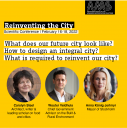
From February 16 to 18, 2022 AMS Institute hosts the scientific conference "Reinventing the City". Working on urban challenges requires cooperation on a multi-stakeholder level. This is what we do as an institute, and is also the primary goal of the conference. "To share and discuss multidisciplinary insights and inspire each other to take actionable steps towards sustainable urban transformations."
The conference will bring together over 200 urban innovators ranging from scientists, policymakers, students to industry partners. We will discuss how cities can transform their systems on a metropolitan scale, to become more livable, resilient, sustainable and offer economic stability. Don't miss out on this amazing event, and register now.
This is event is hosted by AMS Institute in collaborations with the City of Amsterdam.
Boost je Buurt | Challenge voor impact ondernemers | Meld je aan!

Ben jij een Amsterdamse ondernemer met impact? Doe dan mee aan de buurtchallenge Boost je Buurt!
Voor Boost je Buurt selecteren Amsterdam Impact en Impact Hub Amsterdam per stadsdeel of stadsgebied 3 à 4 (startende) impact ondernemers die werken aan de maatschappelijke uitdagingen in de stad.
Deze 24 tot 32 ondernemers uit Centrum, Nieuw-West, West, Noord, Oost, Zuidoost, Zuid en stadsgebied Weesp winnen een ondernemersprogramma ter waarde van €2.500,- en maken kans op een aanvullend ontwikkelbudget van €2.500,-, €5.000,- of €7.500,-. Tijdens de finale op 30 juni worden er drie juryprijzen én drie publieksprijzen uitgereikt.
De Boost je Buurt inschrijving start op 10 januari. De deadline voor het aanmelden voor Boost je Buurt is 25 februari 23.59 uur.
Meer informatie en aanmelden kan via amsterdam.nl/boost-je-buurt.
City of Amsterdam focuses on sustainability and circularity for the seventh edition of its Startup in Residence innovation programme.

The City of Amsterdam is on the lookout for innovators for the seventh edition of its Startup in Residence programme. This year’s programme will focus on the themes of sustainability and circularity, with the city looking for its best entrepreneurs, start-ups, scale-ups and SMEs to develop creative and innovative solutions.
Looking for entrepreneurs who want to transform the food system!

Are you passionate about transforming the food system? Would you like to be supported in finding a co-founder and co-build a business that accelerates the transition to a regenerative food system?
Fresh Ventures Studio is looking for entrepreneurs to build new ventures for a regenerative food system. Fresh supports you to find a co-founder & build an impact-driven business in this space. Apply now for their upcoming 4-month pre-team, pre-idea Venture Builder Programme.
In the program, you'll:
• Meet your co-founder & dream team
• Work on opportunities based on thorough systemic analysis. Co-found a company structured for maximum scalable impact
• Make a supported leap
• Gain access to committed capital, sector knowledge, industry leaders and launching customers that want to see you succeed
Application deadline
No hard deadline. We accept individuals on a rolling basis, so the earlier you get your application in the better.
More information
Find more information about the programme at freshventures.eu
SHARE Meets Food
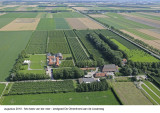
SHARE Meets op 6 oktober staat in het teken van Food. Het programma voor ondernemers is een live bijeenkomst op landgoed de Olmenhorst in Lisserbroek. Sprekers gaan in op het thema voeding en de mogelijkheden om het duurzaam te maken.
Ook wordt de SHARE Award uitgereikt, een blijk van erkenning voor een bedrijf dat opvalt in de regio Haarlemmermeer op het gebied van duurzame innovatie en pionieren. Het programma is van 14.00 tot 17.00 uur (inclusief rondleiding).
Vijfde generatie
De eerste spreker is Florian de Clercq, vijfde generatie eigenaar van de Olmenhorst. Hij vertelt over duurzame kansen en de noodzaak van goed rentmeesterschap en biologische landbouw. Hoe kunnen boer en natuur harmonieus samenwerken met oog voor toekomstige generaties? Als iemand op dit gebied recht van spreken heeft is hij het. Sinds de drooglegging van de Haarlemmermeerpolder is het gebied privébezit van de familie De Clercq. In 1998 waren ze pionier door hun eerste boomgaarden om te schakelen naar biologische teelt. Vanaf 2005 is de productie biologisch onder het Eko-keurmerk. Met hun variatie aan planten, dieren en micro-organismen onder én boven de grond zorgen ze voor een weerbaar landbouwsysteem.
Krachten bundelen
In 2050 moet het voedselsysteem voedselzekerheid bieden aan tien miljard mensen wereldwijd. Het is een grote uitdaging om dat gezond, lekker, betaalbaar en duurzaam, geproduceerd met respect voor dier en de aarde, te doen. Volgens Marjolein Brasz, managing director van Foodvalley NL, kan de verandering naar een duurzaam voedselsysteem in een stroomversnelling komen als krachten worden gebundeld. Nederland heeft veel ervaring, kennis en een goede reputatie op het gebied van duurzame voeding. En omdat in ons land in staat is om over sectoren en waardeketens heen te werken, is de innovatieve slagkracht enorm.
Zero waste Schiphol
Mike Boks (Business Manager Food & Beverage manager) en Martijn Horsman (Strategisch adviseur Duurzaamheid) gaan in op Zero Waste op Schiphol. Met 67.000 werknemers en doorgaans miljoenen passagiers is het gebied een stad op zich. De coronaperiode is een moment om de duurzame ambities verder vorm te geven. Schiphol zet in op zero emissie en zero waste in 2030. Voor het managen van restafvalstromen werkt Schiphol samen met partners. Welke stappen zijn al gezet? Wat is de meerwaarde? En ook de oproep aan het SHARE netwerk: welke nieuwe kansen voor samenwerking met partners zijn mogelijk?
Tiende keer
Tenslotte is de uitreiking van de tiende SHARE AWARD 2021 door Marja Ruigrok, wethouder Economische zaken en Innovatie Haarlemmermeer. Eerdere winnaars zijn Hero Balancer, Algae Innovations, The Waste Transformers, Rigo Verffabriek, Vital Places, Nijssen Recycling, de Miscanthusgroep en Park 20|20. Zij dragen met hun innovaties en voortrekkersrol op een positieve manier bij aan ontwikkelingen in Haarlemmermeer en de Metropoolregio Amsterdam.
Aanmelden
Vanwege de organisatie is aanmelden verplicht en stuur een e-mail naar externebetrekkingen@haarlemmermeer.nl. De toegang is gratis.
SHARE Haarlemmermeer is een initiatief van Schiphol Group, Rabobank, Dura Vermeer, SADC, Schenk Makelaars en gemeente Haarlemmermeer.
Unpack Impact | 2021

How can we enable systematic change through collaboration between entrepreneurs and financiers? Learn from new entrepreneur-investor models and take the food and agri sector as an example. The event is not restricted to the agrifood topic only.
The world has focused first on energy in its effort to stop greenhouse gas emissions, but agriculture is also a key contributor to climate change and biodiversity loss. Introducing transformative change in agriculture demands involvement from all actors in the value chain, from farmers and producers to investors and consumers. It also needs new economic models. How can investors, organisations, policymakers and farmers collaborate to create a sustainable, transformative change?
Join us for a provocative conversation about how innovators in food and agri are working with forward-thinking financiers to enable new models. How are these models applicable to other sectors? Together with Amsterdam Impact, we invite (soon-to-be) entrepreneurs and investors in diverse contexts to join us to hear the learnings, struggles and opportunities of co-creating new more generative models.
Hear from:
Danielle de Nie (Stichting Wij.land) and Liesbeth Soer (Triodos Regenerative Money Centre) about their collaboration to launch Aardpeer, an organisation making land available to nature-inclusive farmers. They will share insights on dealing with the issue of acquiring expensive farmland while transitioning towards sustainable change in agriculture.
Brad Vanstone (Willicroft), brings quality plant-based cheeses to market and is now working with Dutch dairy farmers to help them transition to more sustainable alternatives. As a systems-aware impact entrepreneur, he will share learnings on building a values-based enterprise and marketplace.
Eva Teekens (ReNature) brings both the entrepreneur and investor perspective in how to approach the transition to a regenerative model, and particularly in generating the first agroforestry carbon credits in Brazil, together with Rabobank through their new carbon marketplace Acorn.
Keynote
Our special keynote speaker is Joel Solomon<b>,</b> founding partner of Renewal Funds, Canada's largest mission venture capital firm, and co-author of The Clean Money Revolution, addressing investment strategies to boost systematic impact and transforming the culture of capitalism. Joel will share what he has learned from his wide experience in pioneering the integrated use of capital for social impact and strengthening sustainable businesses across various sectors.
Reserve your online-spot here !
Program:
14:30 Welcome by Tatiana Glad, Co-founder and Director, Impact Hub Amsterdam and Ellen Oetelmans, Program Manager, Amsterdam Impact (City of Amsterdam)
- Conversation with Aardpeer, Willicroft and ReNature in a talk show style with audience Q&A
- Keynote speaker: Joel Solomon with audience Q&A
17:00 Close
This event is organised by Amsterdam Impact & Impact Hub Amsterdam.
The birth of a new green cooperative

In the city of Arnhem a new green cooperative is founded by the students and teachers of the course "Organic Growing in the City". The new cooperative is two years old and has 54 organic urban growers as members. You will watch the green cooperative growing in the future years.
Demoday Circular City x Mobility
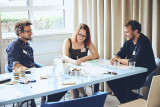
Demodays are part of our innovation process and intended to boost the progress of the various innovation projects, put requests for help on the table, share dilemmas and involve others in your projects or challenges. We host them every 8-10 weeks.
Invitations are sent but we're always open to adding a few new names to the list.
During Demo days, community members pitch projects and ask for input. In small groups we work on concrete questions. We organize workshops with our partners to get a step further in the process. All in a very positive, open and cheerful vibe.
This time on the agenda:
Pitches:
Electric charging service hub – Beelen Mobility
There are more and more electric cars that also need to be charged. This growth cannot be fully accommodated with charging hubs in streets. De Beelengroep is developing a charging hub, a place where you can charge your car, and do other useful or fun things in the meantime. These hubs are well integrated into the energy system and do not place a greater burden on the grid. How do we make this even better?
A smart city, that's how you do it - Future City Foundation
Digitization and technology will fundamentally change our cities, regions and villages in the coming years. But what instruments do we need to make this happen in the best possible way? In the City Deal 'A smart city, that's how you do it' we develop, test and implement these instruments.
From Waste to Harvest – De Gezonde Stad
In Amsterdam we throw away organic waste together with household waste. The 'From Waste to Harvest' project takes a concrete step towards a circular and healthy city. More than 100 people have registered and deliver their organic waste to the neighborhood garden, which is used to make valuable compost. De Gezonde Stad tells how to involve people and let them experience the value of their 'waste'.
Workshops:
Robots and a liveable city – TU Delft / AMS Institute
In the near future, robots will most likely take to the streets to do their jobs. Think of robots that deliver groceries or medicines, or robots that support in keeping the city clean and pleasant. How can we design these robots in such a way that they can share public space with us in a harmonious way?
Supply of catering, by water – City of Amsterdam
For 20 years, efforts have been made to increase transport by water. There is still a lot of logistics space here. It can therefore relieve the road, and water transport can also be clean. Technology is available, but there is no business case yet.
Shared mobility – solution or annoyance?
We keep seeing forms of shared mobility; cars, scooters and cargo bikes. A nice development. But in many cities it also leads to problems. How do we ensure that we actually use these new forms of mobility to reduce problems, emissions and use of raw materials?
Want to join? Have a question? Let’s hear it in the comments!
CIRCO | Call for partners

Impact Hub Amsterdam is officieel CIRCO Hub van Noord-Holland. Dit betekent dat wij CIRCO Tracks voor MKB’ers gaan organiseren om innovatie binnen diverse circulaire thema’s te versnellen.
Heb jij een suggestie voor een goed thema of onderwerp? Dan komen we graag met jou in contact! Denk aan producten in bijvoorbeeld sectoren als bouw, textiel, plastics en voedsel.
Wil jij voor jouw bedrijf en/of branche een stappenplan en nieuwe visie omtrent circulaire ondernemingskansen ontwikkelen? Neem contact op.
Meer informatie over CIRCO en contactgegevens vind je op onze website > https://bit.ly/CIRCOhub
Circo Hub Noord-Holland is een initiatief van Impact Hub Amsterdam, Circulair West, Noorderwind en Natuur en Milieufederatie Noord-Holland.
Take a virtual tour of eco-hub de Ceuvel

At de Ceuvel we host private tours for interested individuals, schools, companies and other parties. Whether you’re an architect, technical engineer, a high school student, or just a generally interested person: there will be someone at de Ceuvel that can explain our story in a way that’s relevant to your background.
The tour covers the story of De Ceuvel. You will learn about sustainability & the circular economy, urban renewal strategies, architecture and communal experimentation and bottom-up development.
Our virtual tour of de Ceuvel was developed during the corona lockdown. Instead of physically visiting our site, we can show you around virtually! The online tour, or webinar, is conducted in a Zoom meeting. Our guide welcomes you in this virtual environment at a time and date of your convenience. Using photos, exclusive videos and illustrations unavailable elsewhere, we tell the story of our unique site. There will be ample time for questions and conversations with the live tour guide.
The virtual tour can be given to a large group of Zoom participants, or as a remote speaker during a physical event. It is suitable in various contexts: as a guest lecture for schools or universities, as a program item of an (online) sustainability conference, as part of a more extensive (company) training course, or in whatever setting you've designed.
A pebble can start a ripple effect
The time to make a change is now. The world is in motion: COVID19 lockdowns changed our perspectives on life as we know it, the cities we live in are exposed to devastating nature extremes this summer and the IPCC report fast-forwarded our sense of urgency. Do you have an awesome idea that can make an impact, then join the AMS Startup Booster to fast-track your idea. Deadline for applications is extended till September 12.
Are you wondering if the AMS Startup Booster can help you turn your business into a successful business. Then please get inspired by the stories of Mublio and Swugo.
Mublio bootstrapped their business and a year later they're selling their first product! Their first product is tailor-made, affordable, built-in cupboards to make efficient use of the space underneath your stairs.
Swugo wants to help reduce CO2 emissions in our urban environment and attribute to getting Amsterdam car-free by electrifying bikes. The Booster helped them to gain access to a European Mobility accelerator where they have extended their potential client base to other European cities.
Transforming the food system through impact-driven ventures
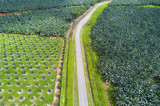
A sustainable food system is critical to our social and planetary well-being.
New initiatives have a big role to play, and Metabolic's newest venture, Fresh Ventures Studio, is looking to help build promising companies to solve systemic challenges.
Fresh Ventures is a venture-building program and startup studio based in The Netherlands. They co-found companies with experienced professionals and entrepreneurs to address systemic challenges in the food system.
If you're an entrepreneur looking into building a venture that responds to the world's sustainability challenges, sign up with Fresh: https://www.freshventures.eu/
More about its establishment and purpose from this article.
Reimagining our relationship with land through regenerative agriculture.
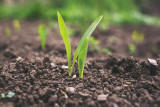
The term regenerative agriculture is popping up more and more often in news and articles. Often mentioned as the key to agricultural green transition, important for carbon sequestration purposes… but what is it exactly?
Regenerative farming, or farming in line with nature, also known as restorative agriculture or eco-agriculture, is a nature-based solution, and it is significantly different from organic farming.
Learn more from this article.
Stay up to date
Get notified about new updates, opportunities or events that match your interests.

